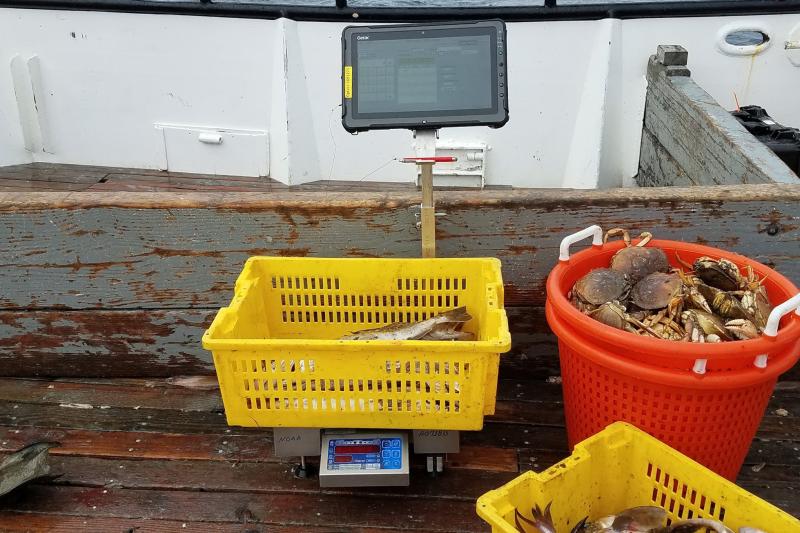The information collected by observers and at-sea monitors is essential to successful science-based fisheries management. Gathering and recording accurate data while aboard a vessel is challenging work. It’s the first step in a much longer process of validating and integrating the data for use by scientists and managers.
Historically, observers have collected data on paper forms for manual processing, but many programs are moving the entire data collection process to a paperless system. This improves cost and timing efficiencies while reducing potential errors in the data itself. Our Northwest Fisheries Science Center has put a new paperless system to the test, and the lessons learned can inform other projects across the country.
The program has traditionally used paper-based data collection and documentation of fishery catch weights (e.g., groundfish, shrimp, midwater species) for trawl and fixed-gear, rod and reel, longline, and other gear types.
In the paper-based process, the information is calculated, entered into an offline database while at sea, and then synced to an online database once on land. Then, observer program staff review the data, consider edits or corrections, and if necessary, require resubmissions before the data becomes available to end-users.
To address their goals to streamline the traditional workflow, the observer program has been developing a system that includes data entry into a handheld device. This eliminates error-prone processes like transcription and calculation, and enables electronic data archiving.
“Improvements to our data collection process resulted in faster data turnaround and catch quota updates for vessels that participated in our program,” says Jason Eibner, a former observer who has worked for 12 years at the Hatfield Marine Science Center in Newport, Oregon, part of our Northwest Fisheries Science Center.
“We realized that a paperless electronic data collection system would help us work even more efficiently by removing the most tedious and time-consuming steps. At the same time, we’re increasing data accuracy and providing our observers with some deserved down time in the field,” added Eibner.
Reliable System Withstands the Seas and Meets Varied Needs
Eibner’s development team included Eric Brasseur of the Pacific States Marine Fisheries Commission, current and former Northwest Fisheries Science Center staff members, and observers. They tackled the challenge of creating a mobile, electronic, commercial fishing vessel sampling station that could be brought aboard any fishing vessel along the West Coast covered by the observer program.
The station would need to be portable and easy to assemble, cover all gear and vessel types, and be equipped with reliable hardware and adaptable software. Most important, it would need to be durable enough to withstand salt air, saltwater, and other tough environmental conditions at sea.
In 2015, Eibner obtained funding through the Fisheries Information System program in conjunction with the National Observer Program’s Electronic Technology Program and the National Catch Share program. This funding supported the development of a pilot system to collect observer data through direct entry into a device.
Teamwork, Trial and Error, and User Engagement
Fast-forward 5 years, the development and testing is completed. The team has rolled out the fully implemented Observer Program Technology Enhanced Collection System, or OPTECS. Along the way, they learned valuable lessons to guide other projects looking to implement new technologies. The team shared some of those lessons in an FIS Electronic Technologies Professional Specialty Group webinar earlier this year:
- Focus on the core system: Don’t attempt to implement a system with all of the desired components at once. Plan development toward a minimally viable product that collects the most basic data end-to-end successfully and then build up from there.
- Make sure all users are on board: Support from users and administrators approving the project is critical. Include all staff and observers when an initial product is ready for feedback, facilitating a user-friendly testing environment with open lines of communication. Eibner says that for OPTECS, “The initial product had to be at least as fast as paper, and once we solicited feedback, it was important to demonstrate improvements. Being responsive to bugs and integrating beneficial user suggestions helped gain trust in the software and shaped it into an effective tool.”
- Establish backup protocols: Having a set of backup protocols in place prior to field testing is critical. The OPTECS team experienced two losses of partial trip data when the test unit had malfunctions. Their big takeaway? Backup to a thumb drive after each haul.
- Code smart and check your work: Keep ease of software updates and future developments in the forefront when writing program code. And of course, be sure to develop a robust system for error checking. Include checkpoints during the data entry phase, and additional checks before syncing.
With OPTECS now in place on the West Coast, electronic reporting technologies have led to increased efficiency and improved data accuracy. Sharing the lessons learned from the development process has the potential to help other regions see similar results and to continue to push fisheries-dependent data collection into the future.





